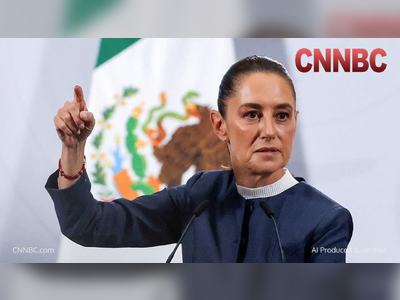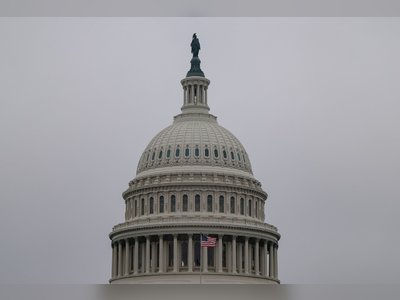Renaming Geopolitics: Mexico's President Engages with Trump's Gulf Proposal
Claudia Sheinbaum offers a witty rejoinder to Donald Trump's Gulf of Mexico renaming initiative, hinting at diplomatic complexities ahead.
In a light-hearted clip and pointed diplomatic exchange, Mexico's newly elected president, Claudia Sheinbaum, offered a satirical retort to former U.S. President Donald Trump's proposal to rechristen the Gulf of Mexico as the "Gulf of America." Standing before a detailed world map during her routine press briefing, Sheinbaum suggested dryly renaming North America itself as "América Mexicana," or "Mexican America," drawing attention to an 1814 document predating Mexico's constitution that described the continent in this fashion.
The suggestion was laced with humor as Sheinbaum quipped, "That sounds nice, no?" highlighting the long-standing nomenclature, as the Gulf has retained its name since 1607.
Trump, gearing up for his second term inauguration slated for January 20, announced his intention to rename the Gulf in a statement on Tuesday, labeling it "the Gulf of America, which has a beautiful ring." Accompanied by criticism of Mexico's governance, he added, "It's appropriate.
And Mexico has to stop allowing millions of people to pour into our country." Trump's remarks were met with a swift critique by Sheinbaum, who rebutted the former president's claim that the country was "run by drug cartels," asserting firmly, "In Mexico, the people rule."
This verbal sparring marks an early test of the evolving diplomatic rapport between Sheinbaum and Trump, raising the question of how Sheinbaum intends to address Trump's assertive diplomatic strategy and pronounced policies on deportation and taxing partners like Mexico.
Her predecessor, Andrés Manuel López Obrador (Amlo), known for his blend of populism akin to Trump's style, managed to forge a working relationship, partly by stemming the flow of migrants northward under U.S. pressure, thereby bolstering Trump's immigration objectives.
The rapport's sustainability, however, might face hurdles under Sheinbaum's leadership; she, unlike Amlo, is a scientist and a leftist, diametrically opposed to Trump's approach despite her pragmatic ideology.
While the Mexican president's jest spread rapidly across social media, it subtly set the groundwork for the Sheinbaum-Trump diplomatic engagement going forward.
"Humor can be a good tactic.
It projects strength, which is what Trump responds to.
It was probably the right choice on this issue," commented Brian Winter, vice-president of the New York-based Council of the Americas.
However, Winter also noted that Sheinbaum will need to brace for more rigorous discussions on vital matters such as immigration, narcotrafficking, and bilateral trade.
Sheinbaum's tactful yet robust responses continue beyond mere humor.
Addressing Trump's intent to impose a 25% tariff on Mexican imports, she countered with the possibility of reciprocal measures, warning that such economic policies would spur inflation and job losses not only in Mexico but equally in the United States.
Yet, her stance on immigration appears more aligned with historical Mexican policies intended to deter northward migration flows.
Initially resistant, Sheinbaum shifted towards openness, suggesting potential acceptance of deportees from varied nations, albeit with limitations or a possible request for compensatory agreements.
This unfolding narrative signals a broader challenge for both nations as they navigate a relationship teetering between cooperation and confrontation.
The implications of their dialogues will likely resonate beyond North America's geopolitical landscape, influencing migratory patterns and economic treaties amid palpable global scrutiny.
Sheinbaum's adept balance of humor and diplomacy in addressing cross-border issues may offer a glimpse into her emerging foreign policy doctrine.
The suggestion was laced with humor as Sheinbaum quipped, "That sounds nice, no?" highlighting the long-standing nomenclature, as the Gulf has retained its name since 1607.
Trump, gearing up for his second term inauguration slated for January 20, announced his intention to rename the Gulf in a statement on Tuesday, labeling it "the Gulf of America, which has a beautiful ring." Accompanied by criticism of Mexico's governance, he added, "It's appropriate.
And Mexico has to stop allowing millions of people to pour into our country." Trump's remarks were met with a swift critique by Sheinbaum, who rebutted the former president's claim that the country was "run by drug cartels," asserting firmly, "In Mexico, the people rule."
This verbal sparring marks an early test of the evolving diplomatic rapport between Sheinbaum and Trump, raising the question of how Sheinbaum intends to address Trump's assertive diplomatic strategy and pronounced policies on deportation and taxing partners like Mexico.
Her predecessor, Andrés Manuel López Obrador (Amlo), known for his blend of populism akin to Trump's style, managed to forge a working relationship, partly by stemming the flow of migrants northward under U.S. pressure, thereby bolstering Trump's immigration objectives.
The rapport's sustainability, however, might face hurdles under Sheinbaum's leadership; she, unlike Amlo, is a scientist and a leftist, diametrically opposed to Trump's approach despite her pragmatic ideology.
While the Mexican president's jest spread rapidly across social media, it subtly set the groundwork for the Sheinbaum-Trump diplomatic engagement going forward.
"Humor can be a good tactic.
It projects strength, which is what Trump responds to.
It was probably the right choice on this issue," commented Brian Winter, vice-president of the New York-based Council of the Americas.
However, Winter also noted that Sheinbaum will need to brace for more rigorous discussions on vital matters such as immigration, narcotrafficking, and bilateral trade.
Sheinbaum's tactful yet robust responses continue beyond mere humor.
Addressing Trump's intent to impose a 25% tariff on Mexican imports, she countered with the possibility of reciprocal measures, warning that such economic policies would spur inflation and job losses not only in Mexico but equally in the United States.
Yet, her stance on immigration appears more aligned with historical Mexican policies intended to deter northward migration flows.
Initially resistant, Sheinbaum shifted towards openness, suggesting potential acceptance of deportees from varied nations, albeit with limitations or a possible request for compensatory agreements.
This unfolding narrative signals a broader challenge for both nations as they navigate a relationship teetering between cooperation and confrontation.
The implications of their dialogues will likely resonate beyond North America's geopolitical landscape, influencing migratory patterns and economic treaties amid palpable global scrutiny.
Sheinbaum's adept balance of humor and diplomacy in addressing cross-border issues may offer a glimpse into her emerging foreign policy doctrine.












